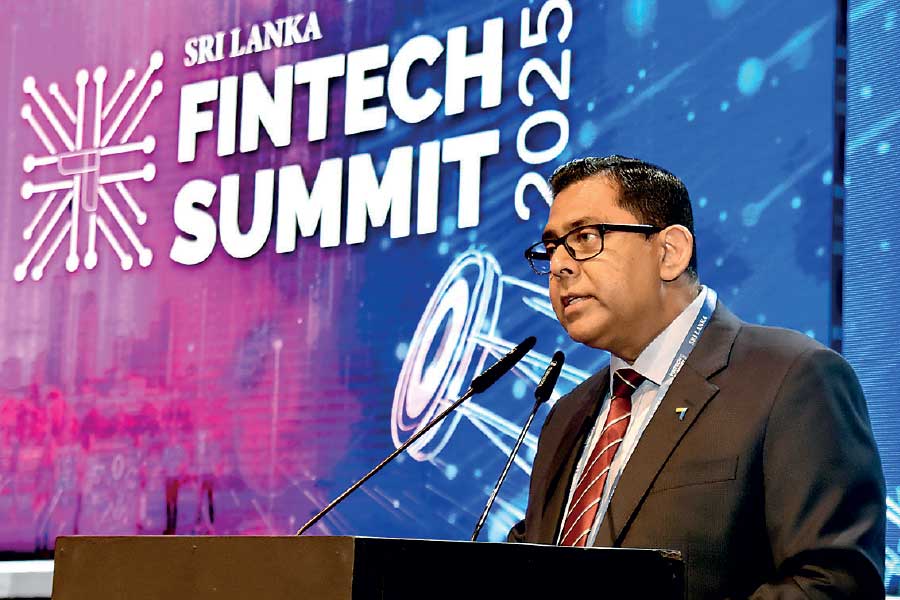Sunday Feb 22, 2026
Sunday Feb 22, 2026
Thursday, 25 September 2025 02:44 - - {{hitsCtrl.values.hits}}

HNB CEO/Managing Director Damith Pallewatte
Inaugurating the Sri Lanka Fintech Summit 2025, Summit Chair and HNB CEO/Managing Director Damith Pallewatte called for a collective effort by banks, regulators, fintechs and investors to accelerate Sri Lanka’s digital finance journey.
Addressing over 600 participants and 25 international speakers, he framed the two-day gathering as a turning point for bridging the gap between the country’s connectivity and its lagging digital payment ecosystem.
“We are proud and honoured to host over 600 participants and over 25 global speakers at this summit,” Pallewatte said. “At the outset, we wish to thank each of you for joining us and lending your support to our critical mission of accelerating Sri Lanka’s fintech journey. But why does this mission matter? That is the case I want to make today, which we will take forward in our panel discussions over the next two days.”
From maritime to digital connectivity
He began by drawing parallels with the island’s past. “Two thousand years ago, Sri Lanka sat on the Maritime Silk Route, connecting with Africa, Arabia and East Asia,” he recalled. “That connectivity brought wealth, knowledge and understanding which enabled development and remarkable feats in engineering, education and healthcare.”
Today, he noted, geography remains the same, but the nation’s position has changed, as have the pressures across Asia such as rising costs, technological disruption and a younger generation “that wants to move faster than legacy systems allow.”
“The meaning of connectivity has expanded from physical to digital. At the heart of these dynamics is a crisis of vision and purpose,” he warned. To meet the aspirations of Millennials, Gen Z and Gen Alpha, he argued, Sri Lanka must offer “a vision of the future in which they are empowered, independent and free to choose their own path.”
Regional lessons, local progress
Pallewatte highlighted how fintech has transformed economies in China and India. “Fintechs have grown to a rate of over 80%, resulting in significant financial inclusion among previously unbanked populations through mobile payments and digital wallets,” he said.
Alternative lending, he added, increased economic participation and growth, while governments benefited from rapid cash transfers, reduced waste in public spending, and higher tax revenue due to fintech-enabled transparency.
Sri Lanka, he noted, has built a strong foundation. “We have more mobile connections than people, and a notable majority are broadband-enabled. CEFT, launched in 2015, enabled 24/7 interbank transfers, and within three years about 8% of retail transactions used it,” he said.
By end-2024, that figure had reached 70%, with over 200 million transactions worth Rs. 17 trillion, half the country’s GDP. Digital payments are growing fast, with LankaClear processing more than 400 million online transactions in 2024, a 50% annual increase. Yet, he acknowledged, “cash remains sticky, particularly at the grassroots of the economy. While we are strong on connectivity, we still lag behind substantially in fintech and digital payment ecosystems.”
Barriers to adoption
Pallewatte identified four barriers that will be addressed during the summit: fragmentation between banks, fintechs, regulators and investors; low transaction frequency per person; limited data sharing due to the absence of common standards; and a lack of trust and literacy.
“Until payments are a daily habit, the benefits stay theoretical,” he said. “Without open data, credit cannot flow where it should. And people do not adopt what they don’t understand or trust.” He stressed the need for plain language, transparent pricing, effective redress, and products that respect customer time and attention.
Summit objectives
The summit, he explained, is designed around four objectives: bringing together all stakeholders on one platform, learning from global digital transformation experiences, contributing to Sri Lanka’s 2030 digital economy aspirations, and building an ecosystem to accelerate fintech adoption.
“We believe speed without safety destroys trust, while safety without speed destroys relevance. So we need both,” he said. He framed responsibility in three terms: **usage, access and trust**. Usage means digital must become the default because it is easier and faster than cash. Access means ensuring no one is excluded due to distance, disability, language or device. Trust means transparency in how data is used, what it costs, and how customers can get help when things go wrong.
Modernising financial rails
Calling for modernisation of financial infrastructure, Pallewatte said: “Our current rails are reliable but they cut our speed. The task is to keep reliability and remove the gap, modernise core systems carefully, expose secure APIs, and move step by step from online files to real-time flows.” He stressed the need to meet generational expectations for core services that are “instant, open and fair.”
“When systems feel slow or closed, trust erodes,” he observed. “Fintechs can be a tool to rebuild trust through speed, transparency and choice.”
Role of banks and stakeholders
Pallewatte positioned the banking industry as both catalyst and convener. “We will keep investing in the rails while competing hard on experiences that delight customers and lower business costs,” he said. “But let me be clear: no bank or company can do this alone. The only way to move the country is together, banks, fintechs, regulators, telecoms, payment networks, platforms, investors and academia.”
He appealed directly to each group: “From government and regulators, we need clear, agile rules like open banking and shared utilities, with consent and redress simple enough for a citizen to understand. From the banking fraternity, committed resources, less duplication, published APIs, and usage metrics that matter. From startups and investors, problems worth solving, built for MSMEs and underserved communities, designed for trust from day one. From academia and development partners, help us measure what matters and raise financial literacy nationwide.”
Pallewatte concluded by welcoming participants to embrace the summit’s vision. “To achieve our objectives, let’s debate, collaborate and commit not only to ideas but to outcomes,” he said. He explained that the summit includes broad panels, executive roundtables with topic experts, and showcases of fintech propositions and national priorities.